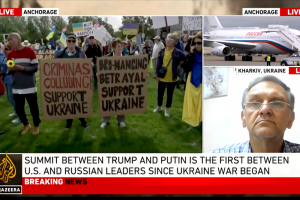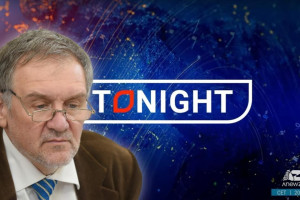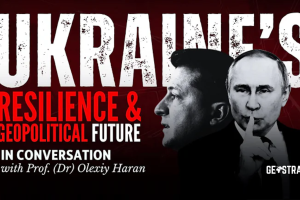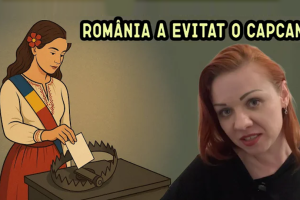International Leaders Came to Kyiv and Left. What’s the Take Away?

Political Scientist Olexiy Haran tell Marta Dyczok why so many international leaders and delegations came to Kyiv and what this means
Dyczok: There was a flurry of high level international visitors to Ukraine this week: the US Sate Secretary Rex Tillerson, the new US special envoy to Ukraine Kurt Volker, the Secretary General of the United Nations, the Secretary General of NATO, the President of the European Union, Council of Europe. They are all coming to Ukraine this week. To speak about what this all mean we have a very special guest Olexiy Haran, a professor of political science at the National University of Kyiv Mohyla Academy and Research Director at the Democratic Initiatives Foundation. He is regular commentator in Ukrainian and international media, the top in political scientist and international relations in Ukraine. Thank you very much for finding time to speak to us.
Professor Olexiy Haran: Thank you for the invitation.
Dyczok: Professor Haran, why did Ukraine became flavour of the week? After months of being not in the news, suddenly it seems like every important person is coming to visit Ukraine to meet with Ukraine’s leaders? What’s important about this week? Why are they all here?
Haran: I think it actually reflects not only the role of Ukraine in this region of Europe, but it also reflects the long way which Ukraine has come after the Revolution of Dignity. As a result of different agreements which were signed between Ukraine and international partners. It is also connected to the G20 Summit.

Political Scientist Olexiy Haran and Marta Dyczok in a strudio of Hromadske Radio
Dyczok: I was going to ask about that. It happened last week in Hamburg.
Haran: The conflict in Eastern Ukraine, the Minsk process… Actually we celebrated 20 years of the signing the Charter on Distinguished Partnership between Ukraine and NATO. For that there was a special session of representatives of the Parliamentary Assembly of NATO countries which happened in Kyiv in Verkhovna Rada [Parliament.] Also there was another event: the Secretary General with the Council of NATO, which means representatives to NATO from every member of NATO, held meeting here with high level Ukrainian officials. It was formally connected to anniversary of the Charter but definitely there were a lot of burning and vital issues related first of all to the Russian aggression, what Ukraine expects from NATO, what Ukraine would do for NATO.
It was a good opportunity to sum up what have been done in relations between Ukraine and the West, and what has been done within Ukraine. I would start maybe from discussing two really important issues in Ukraine-EU relations which have geopolitical meaning. We know that the annual summit EU-Ukraine just happened in the capital of Ukraine. Two very important issues and achievements. First, visa-free regime for Ukrainian citizens. This is extremely important. Ukrainians were striving for that. They did a lot to achieve this. The EU confirmed that Ukraine has fulfilled all the criteria in order to receive it. Finally we got it.
Dyczok: It’s such an amazing feeling.
Haran: It is.
Dyczok: You travelled a lot. Have you travelled since the visa –free regime was introduced?
Haran: Actually not yet. I now have Schengen visa. [This visa allows free movement in the Schengen area, 26 countries, 22 EU members and 4 EFTA members.] But a lot of my colleagues and friends are planning their family travels to Europe. Now they do not need any visas. This is really important. The statistics during the first month of the visa-free regime: 100, 000 Ukrainians travelled to the EU with new biometric passports, without Schengen visas. There were cases when Ukrainians were not allowed — 50 such cases. So 100, 000 travelled and there were problems only with 50 who could not prove the aim of the trip or they stayed too long in Europe before. I mean the number is extremely low proportionally. In general, it’s successful. It shows that Ukrainians now have this wonderful possibility. I will tell you from my emotional experience. When I first received a long term Schengen visa long time ago in 1995, at that time I was based in Germany on a fellowship. It was an extremely wonderful feeling when you can go to Brussels, Paris and Amsterdam. Incredible. I also remember before our neighbouring countries – Poland, Czech Republic, Hungary — joined the Schengen agreement, we, Ukrainians, had a possibility to travel to these countries with just our foreign passports. You just buy a ticket, sit down and you go. Emotionally it is very important to feel you are a citizen of Europe and the free world. Now it is back again but we can travel not only to Poland, Czech Republic or Hungary, but to all European countries.
Dyczok: And all EU countries can travel here more easily.
Haran: Citizens of the EU could enjoy this regime immediately after the Orange Revolution. It was introduced under Yushchenko [President of Ukraine 2005-2010]. There was some discrepancy, I would say. Because they could travel and we could not. But now we are in the same boat. So that’s the first thing. Secondly, finally the Association Agreement between the EU and Ukraine came through, and that’s what Ukrainians were fighting for. That was the first reason why Ukrainians organized Maidan. So it came into forth formally and officially. Because de facto it was in force, but there were some problems with ratification, related to the consensus and connected to the results of referendum in Netherlands. It was not clear how formally from the legal point of view it could be. So now it’s solved and we have this Association Agreement. This is also an incredible step forward.
Dyczok: Now we have a concrete result.
Haran: Yes. The Association Agreement is a very large volume, more than 1000 pages long.
Dyczok: The EU is bureaucratic.
Haran: That’s right. They have the road map in every sector of the economy, domestic policy such as fighting corruption, Rule of Law, justice, security. Now we are to implement it. Definitely it’s a new start, a new phase.
Dyczok: I am sorry to interrupt but I would like to get back to our high level visitors that have been passing through Ukraine this week. You have been following these visits, the statements, the meeting with Ukrainian officials. What are the key messages, the key statements that you heard from Tillerson, from Stoltenberg, from any of these leaders? Anything that stands out for you?
Haran: Yes, I will concentrate on two things: first is the Minsk process, second is our relations with NATO. So, I think what was really important was that President Poroshenko met with Trump before the G20 summit, so, he could deliver Ukrainian arguments before Trump’s meeting with Putin. And after this meeting, after G20, Tillerson came to Ukraine. So, again, in order to explain to Ukraine the dynamics and this is really important that the fate of Ukraine is not decided by somebody, but not from … not by Ukraine.
Dyczok: Is this a shift in US-Ukraine relations because people were very afraid when Trump was running for President and when he was elected the massages about Ukraine?
Haran: I was also very afraid, frankly speaking. So, what we see right now? There is still a lot of uncertainty. OK, because we know that President Trump is not, in some cases, not very predictable what he can do. But what is clear is definitely that many people in Trump administration now they understand really what is going on in Ukraine. They define Russia as aggressor, they understand the reasons for the conflict and actually Tillerson, he repeated that, first of all, Russia is to withdraw from Ukraine. Full stop. By the way sanctions would not be removed. What is also important is that the United States appointed a special envoy on Ukraine negotiations Kurt Volker. I pronounce his name in the German way, but Americans pronounce it as Walker. So, this is also important because that is what Ukrainian side actually demanded because we have Normandy process, right? But US formally is not part of this process. They participate, but they are not formally part of the process and we remember that the United States and the UK and Russia signed Budapest Memorandum about the security assurances to Ukraine. So, Ukrainians would like somehow to formalize the US presence in the negotiations. So, I believe that is really important that now we have the special envoy, and he would connect more closely US to Normandy process. Again that is what Ukrainian side wanted. And one of the messages during these visits wese that the US now understand more, they understand Ukrainian position better, about control of the border. Because we know that according to Minsk agreements, which are very contradictory and very complicated, Ukraine would receive control of the border only at the end of the settlement, right? But, how can we talk about security, about political issues if we cannot control the border? And Russians actually can deploy weapons and regular forces through this open border. So, the Ukrainian position is “OK, we cannot control the border right now formally, according to Minsk agreements, but what would we like? We would like to have the OSCE mission, for example, control the border. And American side now repeats this thesis. So, this is very important. Again, I am not sure how it will develop, how, you know, it was discussed with Putin. They are still a lot of uncertainty and some concerns from Ukrainian side. But there are these positive signals which are very, very important. And finally I would talk about NATO, because there was something new. You know that Ukraine strive to get Membership Action Plan (MAP). Ukraine was very close to getting it in 2006, but unfortunately …
Dyczok: Which was under the presidency of Victor Yushchenko…
Haran: Yushchenko, yes. But unfortunately Prime Minister Yanukovych suddenly changed course and said that we do not want it. In 2008 Ukraine applied again, but the situation became much more complicated. So, we did not receive it, instead we have annual… How is it called? Annual national programs, OK? Cooperation between Ukraine and NATO.
Dyczok: Sea Breeze…
Haran: Yes, this is also part of that. But there is a program on actually what Ukraine is to do in order to move closer to criteria of NATO. So, what is important now? What was raised by President Poroshenko is that he said during the closed meetings, he repeated that during the press conference that Ukraine would like to apply again for membership action plan in 2020, and now to start the dialog about that. So, to start this process. And it is not clear actually what would be the answer from the West. Because some would agree, some would not. There are concerns about Russia and so one, and so forth. What is really important that the public attitudes in Ukraine has changed. So, Ukrainians now support NATO. So, we have…
Dyczok: Could you site statistics for us? This is something you are monitoring public opinion in Democratic Initiatives. So, this is very…
Haran: Yes, so, if we have referendum on NATO, 70% of those who would come to vote would say: “Yes.”
Dyczok: And how did this compare with, I do not know, five years ago or ten years ago?
Haran: 15% were in favor of NATO.
Dyczok: So, this is gone from 15% …
Haran: This is has sky rocketed. We still have regional differences. There are many people, maybe a plurality, in East and South, who would support non-block status, which did not prevent Ukraine from Russia’s aggression. But the any idea of military union with Russia totally collapsed. The same is true about the so called Eurasian Union. So, Ukrainians do not believe in the Eastern vector right now. And there is a support for NATO now which we did not have in …
Dyczok: Five years ago.
Haran: Five or ten years ago and this give some justification for Ukraine to apply for MAP. Again MAP does not mean NATO membership immediately, but this is one step to move closer and to increase security capabilities for Ukraine to withstand Russian aggression. And you know actually again, as I have said, this would not be easy for NATO countries to decide on that. Because on the one hand we have Russian aggression, we have clear violation of territorial integrity of Ukraine and everybody in NATO agrees about that. But then comes the so called Russian factor: should be irritate Russia or not, should be support Ukraine. So, it won’t be easy, frankly speaking, it won’t be easy to have this dialog to push for membership action plan, but it is necessary to talk about that. And Poroshenko knows he has support from Ukrainian society.
Dyczok: Well, we’ll have another interview with a NATO representative and I’ll ask him.
Haran: I think he would be more… My prediction is.
Dyczok: Well, you are probably right, but we’ll have to wait and see. What are some expected outcomes from these visits, these visitors who passed through this week? Sometimes these visitors come, they speak, they make statements, and they leave. Do you see anything concrete coming out of these?
Haran: So first of all, again, like I have said, EU – we finished a very, very important process which Russia tried to undermine and we moved to the next phase of our cooperation.
Dyczok: So this will really nuts and bolts talking about how to implement the agreement?
Haran: Exactly, in very, very concrete spheres like energy, also rule of law, and all others, so this is very important. As to means process, I have said now there is much better building of Ukrainian position and, I would say, support of key Ukrainian…
Dyczok: Concerns?
Haran: Key Ukrainian, yes, positions. The sanctions were continued against Russia. So I would say, it gives weight and also more significance to what Ukraine and western partners can do together in Minsk process.
Dyczok: So more of an understanding of the Ukrainian positions at high levels in Washington and in Brussels?
Haran: Yeah, and so, there is a possibility to put more pressure on Russia within this process. Okay, we cannot predict because we cannot predict because we understand that whether Russian aggression continues depends on Russia.
Dyczok: On Russia.
Haran: But Russia would have to calculate, cost them benefits, and my feeling is that western position now is quite strong because sanctions are continued and we can hear about possibility of increasing of sanction, possibility of interference in American elections, we don’t know about that, how it would happen, but Ukraine’s position now is much stronger in this process. And finally, as I have said on NATO because on NATO we have this corporation
Dyczok: Procedures, standards, and training.
Haran: Again, politically, Poroshenko, he made another steps. And this would involve a longer negotiations.
Dyczok: One more question that just came to my mind, do you see a closening of US and EU position on Ukraine? Because in the past that’s been a concern that the EU, particularly France and Germany are involved in the Minsk process and the US is not. Now there is the special envoy, they’re all sort of speaking the same language, do you see that they are connected?
Haran: Yes, yes, I see, definitely. Again, it’s an interesting situation because we understand that first, we saw this nominating process with some suspicion because it not good understanding of what was going on in east of Ukraine. At that point, American position sanctions, the US was the model of sanction, they did a lot to have EU sanctions against Russia. With Trump election it was a period of uncertainty and at that time two women played an important role, from American and there was a male said it’s important to continue sanctions. Now we see the US now again starting to increase, I would say, increase pressure on Russia, so we see no gap now between US starting to increase pressure on Russian. Again a lot is quite complicated because there are domestic processes in each country, it’s not easy having this united voice. Macron was elected, Macron made strong statements. Poroshenko met with Macron. A good chance is that Merkel will be re-elected, probably. The position of democratic sources is also not … We see some positive in Trump Administration, so I would say now the situation looks much better than it was at the last year.
Dyczok: Absolutely. Thank you very much for that analysis and that insight and optimism.
Haran: And cautious optimistic ending. I don’t think much about
Dyczok: Cautious ending as well. Thank you very much. We’ve been speaking with Dr. Olexiy Haran from the National Kyiv Academy and the Democratic Initiatives Foundation.








